Of Tower Crane Search Result
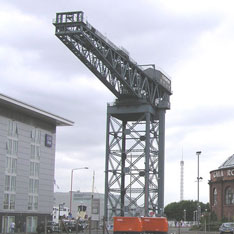
Hammerhead crane
The "hammerhead", or giant cantilever, crane is a fixed-jib crane consisting Of a steel-braced tower on which revolves a large, horizontal, double cantilever; the forward part of this cantilever or jib carries the lifting trolley, the jib is extended backwards in order to form a support for the machinery and counter-balancing
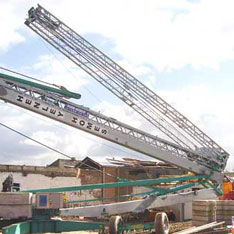
Self-erecting crane
Self-erecting cranes, generally a type Of Tower Crane, also called self-assembling or "Kangaroo" cranes, lift themselves off the ground using jacks, allowing the next section of the tower to be inserted at ground level or lifted into place by the partially erected crane itself. They can thus
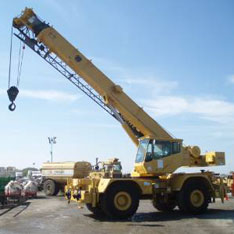
Rough terrain crane
Rough terrain crane is a crane mounted on an undercarriage with four rubber tires that is designed for pick-and-carry operations and for Off-road and "rough terrain" applications. Outriggers are used to level and stabilize the crane for hoisting. These telescopic cranes are single-engine machines, with the same engine powering the undercarriage and the crane, similar to a crawler crane.
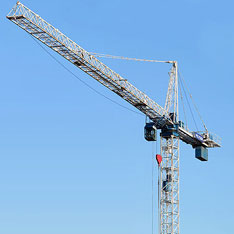
Tower crane
Tower crane is a modern form Of balance crane that consist of the same basic parts. Fixed to the ground on a concrete slab, tower cranes often give the best combination of height and lifting capacity and are used in the construction of tall buildings. The base is then attached to
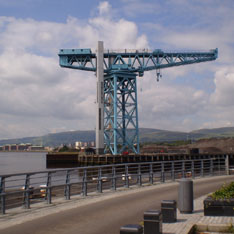
Giant Cantilever Crane
Also known as a hammerhead crane, the giant cantilever crane is a fixed jib crane consisting Of a steel braced tower, on which revolves a large horizontal double cantilever. The forward part of this cantilever or jib carries the lifting crab, and the jib is extended backwards in order to form a support for the machinery and counterbalance.

Cranes
Development depends on infrastructure and infrastructure on heavy machineries. Of all the heavy machines cranes acquire an important position as they are involved in the building and maintenance of huge projects. Crane machines are the huge tower like machineries having ropes meant to lift or to lower any heavy devices. Hence

Tower Crane
over which it swings. In addition, the operator can either be on crane or control the crane remotely using instrumentation located on the building structure, while enjoying an excellent view of the load and its surroundings at all limes. The use Of Tower Crane has become synonymous with medium- to high-rise construction, be it for buildings or for bridges, dams, cooling towers, etc. Tower cranes can be fixed or can be mounted on rails. In the latter case, it is referred to as travelling tower
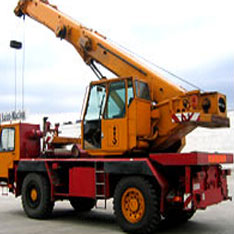
Mobile Cranes
Cranes are not permanent structure. In fact it is a temporary structure either fixed in the ground or mounted on certain vehicles. Cranes are operated either through cab operator or through infrared or radio signals. The important equipments Of the cranes are mast, base, jib and motor. Stationary cranes are fixed whereas mobile cranes are those cranes which are mounted on trucks, trailers, or other engineering vehicles. Mobile cranes can be classified into four major categories: (1) truck
FAQ About Of Tower Crane
- Types of Cranes
- New requirements about crane maintenance and competent inspecting person
- Construction and Maintenance of Cranes and Lifting Appliances
- Stability of Cranes and Lifting Appliances
- Tower Crane Superstructure
- Cranes, lifting appliances and fork lift trucks
- Crane Lifting Operations - Operators of Cranes and Certain Lifting Appliances
- Crane History
- Cranes,overhead traveling crane,Construction cranes,Tower cranes,Mobile cranes,Articulating cranes
- News conference addresses concerns over tower crane safety
- FACTORS BEHIND THE SELECTION OF CONSTRUCTION EQUIPMENTS
- Jacking Towers
- Mobile Cranes
- Mobile Crane Tower Attachments
- Tower-mounted crane
- CABLE CRANES
- Limiting Tower Crane Operator Fatigue
- Tower Crane
- Luffing Tower Crane
- Topless Tower Crane
- Self-Raising Tower Crane
- Popular Construction Equipments or Construction Machineries
- Tower cranes
- Crane Gantry
- Tower Crane For Sale
- Question About Tower Crane - 1
- Question About Tower Crane - 3
- Oregon OSHA’s new crane standard for the construction industry
- BossBuyer Jib Cranes
- Bottom-Slewing Tower Cranes Structure and Configuration
- Wind and Tower Cranes
Cranes - these are lifting devices designed to raise materials by means Of rope operation and move the load horizontally within the limitations of any particular machine. The range of cranes available is very wide and therefore choice must be based on the loads to be lifted, height and horizontal distance to be covered,
What changes have been made affecting crane maintenance and inspection? Owners Of mobile and tower cranes must now declare on plant registration application and renewal forms that their cranes have been effectively maintained and inspected by a competent person. What are the new requirements for cranes? For new applications
the safe and correct procedures to be adopted to ensure the correct erection or dismantling sequence. In these cases manufacturers instruction manuals must always be available and followed. This is particularly relevant in the case Of Tower Cranes where erection and dismantling must be carried out strictly in accordance with the manufacturers instructions. The erection of jibs on cranes, especially mobile cranes, must follow the sequence described in the manufacturers
Where a crane or a lifting appliance is to be used on a slope or on uneven or sOft ground, precautions must be taken to prevent overturning. This can be done, for example, by reducing the slope, levelling the ground or by using suitable supports. If a situation occurs where a tower crane or other crane which needs
rated output power 200kW, rated speed 1800 rpm., max. out torque 1100N.m, emission in compliance with European Construction Machinery Stage II. Control System Intelligent computer integrated program control system Is the key technology Of the crane. PLC program controller is used, with combination of conventional electrics, to realize the function of logic control and electronic proportional control of the system, greatly improving safety, reliability and efficiency for crane operation.
The Regulations apply to cranes and lifting appliances used in the manner described in Regulation 2. The terms "cranes" and "lifting appliances" are defined legally in Regulation 1 which deals with the interpretation Of various expressions used in the Regulations. "Crane" means:- "An appliance incorporating a structural member above ground level, or having a jib, and by means of which a load may be raised, lowered or suspended either by:- a hook permanently
A certificate Of competence must exist for every operator of a crane, excavator, fork lift truck, mechanical grab, mechanical shovel and piling machine. The certificate must be issued by The employer of the operator; or The owner of the equipment which
A crane is a machine that is capable Of raising and lowering heavy objects and moving them horizontally. Cranes are distinguished from hoists, which can lift objects but that cannot move them sideways. Cranes are also distinguished from conveyors, that lift and move bulk materials,
begins and dismantled when the building is completed. An external tower crane is installed outside the building. As the building increases in height, the crane is raised by lifting the upper part of the crane and adding a new section Of Tower beneath it. An internal tower crane is installed within the building. As the building increases in height, the crane is raised by lifting the base of the crane to a higher level within the building..
In the wake of multiple tower crane accidents within the last year, a news conference dedicated to concerns about the overall safety Of Tower Cranes was held in Washington, D.C. The Specialized Carriers & Rigging Association’s executive vice president Joel Dandrea told the audience the main reason for the conference was to address concerns raised by the media
The selection Of the appropriate construction equipment is an important part of job planning. The contractor has many different options to choose from, which makes the selection even more complicated. A planner has to choose the alternative that provides the
lower grippers are similarly engaged; after this, the upper grippers are released. After full retraction, the cycle is repeated. Withdrawn tendon material is spooled. The power pack powering thejacks is normally located at top as well. A pair Of Towers can support one or two point picks. Four towers can be used for either two or four point lifts. In the four-tower arrangement, a crossbeam is employed to support each pair of load-supporting jacks, and header beams support the crossbeam
There was a time when mobile cranes were identified with the United States and taker cranes with Europe, but the globalized modern market for all cranes now transcends regions and borders, blurring these differences. The original author Of this book liked to recall a yam told by a Danish engineer, a tale that summed up a common European view of Americans, expressed in terms of crane practices. The Dane offered the view that the modem descendent of the Old West six-shooter is the
position on the superstructure where a boom is ordinarily mounted. A luffing boom is affixed at the tower top, and ajib is sometimes fitted at the end of the boom. Towers and booms are made up of inserts of various lengths so that a number Of Tower-height and boom-length combinations can be assembled The manufacturer's instructions generally include an advice that the tower boom must be lowered and fastened to the mast when the crane is out of service (an exception is when very
three motions: the hook is raised and lowered by means of a winch and fall, carried in a circular path by the swing gear, and carried in a radial motion by either luffing the jib or rolling a trolley carriage on its underside. The simplest Of Tower Cranes have only these motions, but more complicated arrangements include mechanisms that allow the base to roll on a track, the crane to change elevation by climbing, or the jib to articulate on a hinge point. In the twentieth century,
CABLE CRANES The taut-linc cableway crane consists Of two towers suspended between which a track cable of the locked construction is serving as a bridge structure. A carriage with a handling attachment travels on the track cable with the aid of a haul rope and a winch. The haul rope is revved through
the longer they sit there, the more distracted they may become. Combine that with the constant radio chatter and directions given by the signalperson, and operators will no doubt become mentally tired and fatigued. Dennis Kenna, president Of Heede Southeast, and I began to study the habits of our tower crane operators. When contractors were allowed to work the operators double-time—80 or 90 hours a week—we began to notice that they became mentally strained after sitting in
Function: hoisting · Attached devices: generator, reducer, driver cab, cable, counterweight · Certificates awarded: CQM, CE, TS, ISO9001:2000 · A-grade 315TM Certificate for producing, installation, rectification, and maintenance Of Tower Crane issued by General National Quality Inspection Bureau · Safety system: installation of jib, balance arm, and rotary tower are in side-plate pin bracket method · Advanced technology of the TOSHIBA Japan inverter has bee adopted for
[caption id="attachment_42" align="alignleft" width="360" caption="Luffing Tower Crane "][/caption] Luffing Tower Crane with Maximum Load Of 16t and Working Radius Ranging from 15 to 60m Luffing Tower Crane Key Specifications/Special Features: Maximum Load: 16 T Maximum working range: 60 m Tip load: 2.9 T Working range: 15 to 60m Lifting capacity: 16-3.7 T Freestanding
The mechanisms Of topless tower crane adopt domestic famous factory products, reliable performance, good governing performance and shocklessness [caption id="attachment_47" align="alignleft" width="360" caption="topless tower crane"][/caption] Topless Tower Crane
Self-raising tower crane QTZ, which is a new-style elevating machinery specially designed for the construction Of tall buildings and equipment installation, is a type of self-raising multi-purpose tower crane equipped with level arm support, and it allows trolley derricking and upper slewing. its jib maximum length is 70m, with maximum lifting load of 12000KG.
There is a range Of construction machineries or equipments, ranging from the very heavy machines to the light, portable and mobile equipment. We present below some of the most popularly used construction equipment used for construction purpose. [caption id="attachment_149"
[caption id="attachment_234" align="alignleft" width="241" caption="Tower crane"][/caption] Over-long boom Of Tower Crane is (50/55m),wide range of coverage. Heavy in section of mast section(1600*1600 or 1800*1800), good steel performance,complete tower crane is stable and little swing as load.Main material of crane mast section is 160*160*16 angle steel
A crane, which is equipped with a derrick or tower, is used to lower and lift materials with the use Of pulleys and cable. Heavy equipment manufacturers and the construction industry use cranes in various activities connected with their process. Cranes used in the construction industry are mostly temporary structures either mounted on a vehicle which
Function: hoisting · Attached devices: generator, reducer, driver cab, cable, counterweight · Certificates awarded: CQM, CE, TS, ISO9001:2000 · A-grade 315TM Certificate for producing, installation, rectification, and maintenance Of Tower Crane issued by General National Quality Inspection Bureau · Safety system: installation of jib, balance arm, and rotary tower are in side-plate pin bracket method · Advanced technology of the TOSHIBA Japan inverter has bee adopted for
How Often should you check your tower locking nuts and pins? A. Daily B. Weekly C. Monthly When climbing a ladder what safety position should you hold? A. Centre rung of ladder B. Outside rail of ladder C. Does not matter where you hold on to If
When travelling on a rail-mounted machine; how would you position your working jib? A. Jib side ways over track way B. Travel in reverse C. Jib over track facing direction Of travel What would stop your crane from running off the end of a track? A. Limit switch B. End of track safeguard C. Sand bags When should your Trolley ropes be tensioned? A. Yearly B. Weekly C. As per operators manual Where would the
Articulating/knuckle-boom truck cranes used to deliver materials to a construction site are not covered by the standard when they: Transfer materials from the truck crane to the ground Transfer materials such as sheet rock, plywood, and roOfing material from the truck crane onto a structure using a fork or cradle with functioning automatic overload prevention device What are “controlling entities” and what are their duties? Controlling entities include primary or general contractors
Jib Crane Definition: A cantilevered boom or horizontal beam arm with bearings, hoist and trolley. This lifting machine may pick up loads in all or part Of a circle around the column to which it is attached. Jib cranes can be sturdy enough to lift a ton or more of weight, or small enough to attach to a truck. While people will often rig homemade jib cranes and gantry cranes, building a jib crane
The main parts Of a typical bottom-slowing tower crane include: Undercarriage. Unlike top-slowing cranes, which are often configured without an undercarriage, bottom-slowing cranes would always have an undercarriage to connect between the ground or any other supporting
Like most mobile rigs, self-erecting cranes can fold up on short notice. All other tower cranes must ride out severe storms. That requirement has induced engineers to identify two principal classes Of load combinations germane to the design of these machines: hi-service loads act on the crane in operation, and out-oj-service loads occur under the influence of high winds when the crane is unmanned. Some cranes have an additional load case that applies
Relative Searches
Of Tower Crane, New Crane, mobile crane manufacturer, Mobile Crane, Mini Crane Machine, Of Tower Crane, Operation Crane, Overhead Bridge Crane, Overhead Crane, Overhead Gantry Crane,

Email: sales@bossbuyer.com
Skype: bossbuyer
Market Hotline
0086-21-61435-919
Service Hotline:
0086-21-61435-919
